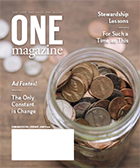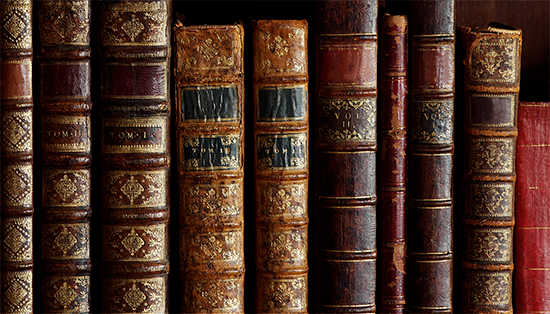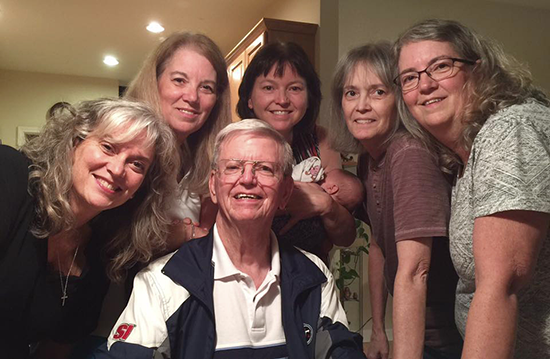
February-
March 2018
Stewardship
Lessons
------------------
|






Call Him Storyteller
By Bill and Brenda Evans
Unlike the narrator of Herman Melville’s Moby Dick who famously said, “Call me Ishmael,” Dr. Robert E. Picirilli prefers to be called storyteller. Ishmael spun out yarns about his life aboard the whaling vessel Pequod and the mad Captain Ahab’s pursuit of a rogue white whale. Dr. Picirilli, on the other hand, tells the Free Will Baptist story by spinning out true accounts of people and events that have made us who we are.
Dr. Pic, as he is affectionately known, is a retired dean, registrar, and professor of Greek, philosophy, and Pauline writings at Welch College. He is author of a dozen books, along with numerous articles for academic journals. For more than four decades, he has served as volunteer collector, archivist, and curator of multiplied thousands of documents and artifacts for the Free Will Baptist Historical Collection at Welch College. Currently, he also chairs the five-member Free Will Baptist Historical Commission that oversees the collection.
Historical storytellers tell stories. Archivists assess and organize documents and artifacts. Curators guard and exhibit them. Each of these, especially a writer of history, is an adventurist of sorts, involved in search-and-rescue schemes. He begins with the will to know, the curiosity and persistence to ferret out information, the chutzpah to nose into and uncover facts, “warts and all,” as Dr. Pic says.
Dr. Pic’s first venture into historical search-and-rescue, if we may call it that, began when he was barely a teen. “A boy I knew sold me his stamp collection my first or second year in high school. I eventually put together and exhibited a well-received collection of early Ivory Coast stamps. But the pleasure was never just about finding and accumulating. The real pleasure was organizing, analyzing, and exhibiting them,” he says.
“Thrilling” and “seized” are words Dr. Pic uses to describe his first excursion into Free Will Baptist history in the early 1950s. “I was a student at Welch and discovered the Free Baptist Cyclopaedia in the library,” he recalls. “I was immediately seized with the idea that this was, indeed, the history of Free Will Baptist people. It was thrilling to read about Benjamin Randall and the New England movement that lit a fire that burned a place in history.”
Later that year, this captivating encyclopedia article, as Dr. Pic describes it, led to his first writing on our history. “I still have that paper I wrote for a class,” he says. But it took a while, he admits, to sort out that history. “Baptist churches of the ‘free will’ variety” like ours are not as simple as he first thought. That complexity intrigued and goaded him to press on. That first captivating historical discovery in the early 1950s flared into a hot search-and-rescue by the early 1970s, and he began a systematic effort to find, preserve, and write about our history. “I traveled two weekends a month for the college, speaking, encouraging enrollment and giving, and pursuing things for the historical collection.” He appealed for district, association, and state minutes and records; for denominational publications of any kind, including pamphlets, booklets, magazines, newspapers; for books by or about our pastors, missionaries, and laymen; for letters and diaries giving accounts of our FWB work.
He also appealed for realia or artifacts from our history, and some eventually landed in the historical collection, including a Jehoiada Chest. In 1942, Mrs. Lizzie McAdams, a home missionary, evangelist, and promotional worker placed 108 hinged wooden boxes with slots in the lids around the denomination to raise funds for missionary work. She called the boxes Jehoiada Chests, based on the High Priest Jehoiada’s plan in 2 Kings 12. The next year, she reported that $765.45 had been raised.

Photo: Dr. Picirilli, pictured with his five daughters.
Dr. Pic’s thrill of discovery has not died. Two books on our history and many articles and blogs later, he is, at age 85, still seized by the urge to find, write, and preserve the stories of our history and our heroes. In 2015 Randall House published Little Known Chapters in Free Will Baptist History. Later this year, a biography entitled Footprints: The Story of John L. and Mary Ann Weaver Welch is due out from Welch College Press. In addition, largely under his guidance and passion, the historical collection housed at Welch Library has grown to tens of thousands of items.
Dr. Picirilli continues to solicit records of our history and heritage. “We depend on donations of materials because we buy very few documents,” he says. “I tell people to contact us and ask if we are interested in an item. We have too many gaps in our history. Clerks and moderators of associations can help. I’ve written to every association in the denomination to appeal for historical documents and never heard from 75% of them. Women usually respond; men less so. Churches and individuals can help us, too.”
Dr. Pic becomes quieter, more reflective. “What if there was a diary from, say, Paul Palmer, founder of the Free Will Baptists in Eastern North Carolina in 1727? As far as we know, there is no diary. But there are other important documents. It’s a tragedy to clean out an attic and burn everything. The Historical Commission wants them. People need to contact us and tell us what they have.”
One fortuitous find came after a call from Mrs. Pinkie Hudgens Christian. It seems she owned a “little record book” once in the possession of her long-deceased father, Reverend J. E. Hudgens, a leading pastor in Middle Tennessee. “Miss Pinkie, as we called her, didn’t know what significance, if any, the book had, and neither did I.” As it turned out, Miss Pinkie’s little book was the handwritten ministerial record of Robert Heaton, who began the diary on August 22, 1809, at age 44, the day he preached his first sermon. Dr. Pic quotes Mr. Heaton in Little Known Chapters: I “stood on the stage to endevour to preach the gospel and spread the tydings of salvation.” Heaton’s ministerial record continued 34 years, until shortly before his death, July 23, 1843.
Heaton’s “little record book” spurred Dr. Pic to additional research. He learned that Heaton’s Separate Baptists of Middle Tennessee were one of the many “tributaries” to the Free Will Baptist denomination that eventually formed in 1935. Tributaries is an often repeated term when talking to Dr. Picirilli about our history. “We have many,” he says. Most of us claim the Randall and Palmer tributaries, rightly or wrongly, but know little or nothing about other important non-predestinarian “free-willers” who have flowed into this stream we now call ours. Dr. Pic writes often about those other tributaries.
For 15 years after his first appeals for help in 1970, boxes of historical documents accumulated. Three Welch College librarians guided him in cataloguing the archive. “Eventually,” he says, “I asked Carol Reid to teach me library science. I learned a lot. The cataloging process made sense to me. Everything that’s catalogued I’ve catalogued.”
The Historical Commission’s current goal, Dr. Pic says, is to make all the minutes of all the associations in our denomination available online. Dubbed The Minutes Project, these scanned documents will be available in text-searchable format on the commission website: fwbhistory.com. Two grants from FWB Foundation have helped to facilitate the project.
Dr. Pic has trained a replacement—Phillip Morgan, history professor at Welch College—for his position as volunteer cataloguer and curator of the historical collection. “I’ve trained Phillip. I’ve taught him everything I know, and he thinks like me. He’s now managing the collection as unofficial curator, a volunteer, of course. I’d love to see curator become a paid position.”
Dr. Pic ends our interview simply: “My goal as a writer is to tell an interesting story, correct wrong impressions, help us understand who we are, and draw out lessons we can learn from those who’ve come before us.”
We can call Dr. Robert E. Picirilli a storyteller…with motives.
About the Writer: Brenda Evans is a retired English teacher. She and her husband Bill live in Ashland, Kentucky. They are proud grandparents of seven.
|
|

